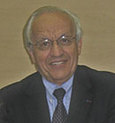
Dr. Jean-Louis Bélard awarded of the Insignia of officer of the Order of Academic Palms
Residence of France, April 24, 2012
Mon Cher Jean-Louis,
Chère Madame,
Ladies and Gentlemen,
It is a great pleasure for our Deputy Chief of Mission Frédéric Doré, our Defense Attaché Général Caïtucoli, our scientific Attaché Robert Jeansoulin and for me to welcome you tonight to the Residence for a rare event, the bestowal of the insignia of Officer of the Order of Academic Palms upon one of the best promoters of French-American excellence in the fields of science and medicine : Dr. Jean-Louis Bélard.
As you all have come tonight to show your support and admiration to Dr. Bélard, I would like to recognize Lieutenant General Eric Schoomaker, who was awarded by my predecessor in this very room with the insignia of Commander of the National Order of Merit. It’s a great honor to have you with us this evening.
Doctor Bélard, in naming you officer of the Order of Academic Palms, Prime Minister François Fillon wished to highlight your exceptional merits. It would take too long for me to list them here, obviously, so I will encompass them into two broad categories: scientific achievements and international cooperation, especially between France and the country you made home: the United States.
In terms of scientific achievements, your distinguished career speaks
for itself. In 1973 you were awarded your doctor title in medicine with the highest distinction at the University of Lyon. Beyond your clinical activity in family medicine you created and directed the Research and Development Command Human Factors Laboratory in charge of the research in nuclear, biological and chemical protection from 1981 to 1985.
.
As a visiting Scientist in the Centers for Diseases Control (CDC) between 1991 and 1999, you directed and designed the research on heat stress, energy expenditure and oxygen consumption in hazardous waste abatement workers. You were at the same time Adjunct Associate Professor of Environmental medicine at West Virginia University, and of Military Medicine at the University of Health Sciences in Bethesda.
In January 2000, your achievements led you to be named research director in the Telemedicine and Advanced Technology Research Center, the TATRC. In charge of the Center’s international contacts and cooperation issues, you succeeded in making of the TATRC a world-famous research center in telemedicine - and I would like to recognize the scientific director of TATRC, Dr. Charles Peterson, who is with us this evening.
Since then, you have been promoted to the position of program director for Complementary Medicines.
You were also appointed scientific director of the Henry Jackson Foundation for the Advancement of Military Medicine in 2004 while keeping your position at TATRC. A year later in 2005, you were named Scientific Chair of the Proposals Review Board which receives and reviews every week around 20 unsolicited research proposals.
This nomination highlights how much you became a reference for so many of your counterparts.
Lastly, you requested from the NATO Human Factors and Medicine panel to consider forming a research technical group on integrative medicine. Since nobody can resist you, the creation of a working group on "Integrative Medicine Interventions for
Military Personnel" was approved the following year.
As the chairman of the group, you directed the first 3-day meeting at Ecole du Val de Grace in Paris in early 2011 with the participation of 15 experts from the US, France, and seven other countries.
In addition to these prestigious positions, you have authored during the past 20 years more than 50 peer-reviewed articles, presentations and book chapters and held academic positions in several French and American engineering institutes
or medical schools.
Your contribution to the progress of science has thus been both essential and impressive.
Cher Jean-Louis, as we have all gathered here today to celebrate your exceptional career, it would be unfair to set aside your contribution to your homecountry: France. You are indeed a bridge across the Atlantic between our two countries and you have been tirelessly promoting French-American cooperation with great results.
From 1985 to 1989 you were the Defence Medical Attaché at the French Embassy in Washington, where you were in charge of French-American medical research cooperation on the one hand and NBC protection affairs on the other hand. You succeeded brilliantly in this position and you are still remembered for having contributed to the settlement of the dispute between Dr. Gallo and Dr. Montagnier over the discovery of HIV.
You initiated many collaborations between our two countries and you also helped promote French technology in the US. The exposition of French NBC protection materials in the courtyard of the Pentagon still works as a model for all who once held your position.
After your departure from the Embassy, you became Secretary of the “Human Factors Technical Coordination Group” in the ministry of Defence and policy officer “Human Factors” in the Délégation Générale pour l’Armement.
Beyond this official assignment, you promoted the Franco-American partnership “bottom-up” with university and military experts of two leading regions in Science: Ile de France and Rhône-Alpes.
These bilateral efforts culminated with the cooperation agreement between the Institut de Recherches Biomédicales des Armées of Brétigny and the US Army Medical Research and Material Command of Fort Detrick, that is to a large extend the result of your personal commitment.
One of the most important aspects of this agreement is the exchange of officers. As we speak, one French army doctor works in the Institute of Surgical Research of the US Army in San Antonio, while one of his American counterparts has an internship in Grenoble.
On a more personal note, I am aware that you are very active, you and your wife, in local charities. It’s been 20 years now that you are living on a permanent basis in the United States. You became an American citizen in 2002 but never turned away from France. You never stopped promoting French image in the US, and fostering cultural relations between your two countries.
You hold many prestigious French and American distinctions, the Legion of Honor in particular. And today in recognition for your commitment to France and to French-American friendship, it is my privilege to bestow upon you the insignia of Officer of the Order of Academic Palms.
Dr. Jean-Louis Bélard, au nom du Gouvernement de la République française, je vous fais Officier de l’Ordre des Palmes Académiques./.














